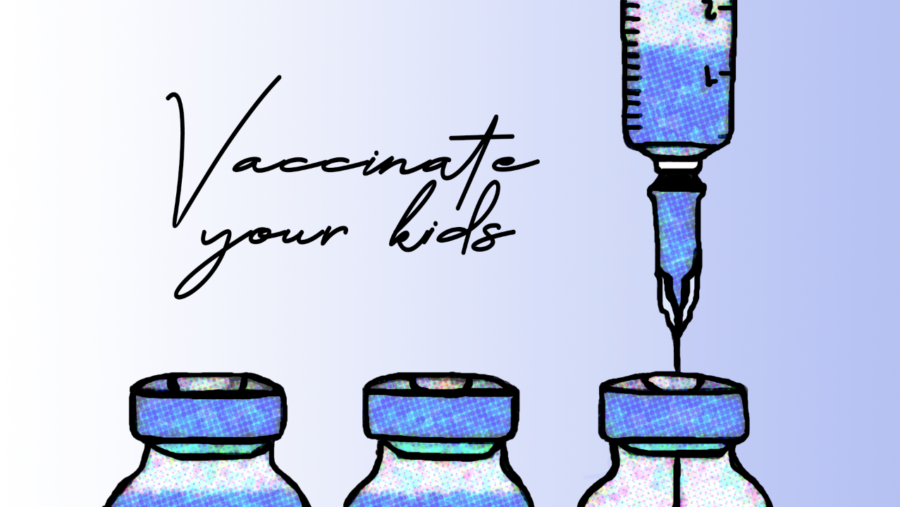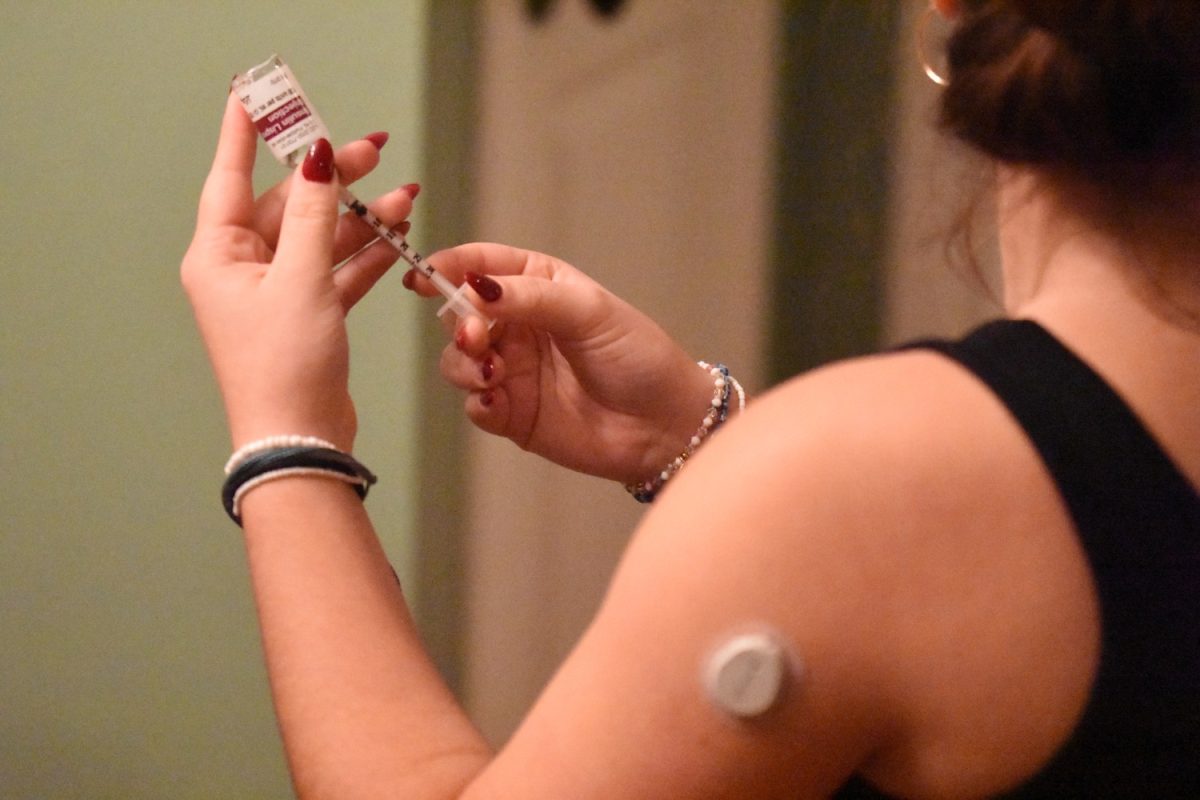Three-hundred and fourteen individual cases of measles were recorded between January and March of this year in 15 states across the country.
Of the 157 cases recorded in Rockland, New York, 82% had not gotten a measles-mumps-rubella (MMR) vaccine. It’s been 2015 since the last American died of measles.
The disease was declared eliminated from the U.S. in 2000.
Even more startling is that 81 flights traveling in the U.S. in the past year had at least one person on board with measles. Why is this a problem? If one person in the vicinity is infected with measles, 90% of the individuals around them will also be infected.
And it’s not just measles. For the first time in 30 years, a child has contracted tetanus in Oregon. It took $800,000 to save him, but, according to most doctors, a single shot would have prevented it from happening at all.
For epidemiologist Jennifer Pavon*, this rapid rise of illnesses is due to vaccine resistance, which she attributes to a lack of education on the subject.
“I think with any misinformation crisis, it really boils down to an educational crisis, where people aren’t educated enough to seek out fact-checked, correct information,” Pavon said. “People who are partaking in this misinformation don’t have the ability to judge what’s true and correct and what’s not.”
According to the World Health Organization (WHO), over 100 countries across the globe offer vaccines. While there are some nations, such as France, which have made vaccinations mandatory, with the exception of California and Mississippi, every state in the entirety of the U.S. allows exemptions from vaccines for either philosophical or religious reasons.
Although there are approximately one to two per every million who will experience complications following a vaccination, it is important to remember that most have had health complications before and that exemptions will always be made for those who have medical reasons supported by a doctor.
The argument often brought to the forefront of the vaccine debate is that no one should infringe upon another’s decision to vaccinate or not vaccinate. However, Pavon argues against this assertion.
“One thing people don’t realize about not being vaccinated is that they think it’s a purely personal issue, that it doesn’t leave the bounds of their house. And they don’t care whether their children get the chicken pox or the measles, but they don’t realize that they’re imperiling the other people in their community.” Pavon said. “From my perspective, I think that people who don’t vaccinate their children should realize that they are endangering the frailest people in their community that their children have interacted with.”
One needs to look no further than at the recent spread of measles across the globe: one unvaccinated child was able to bring the disease back into Costa Rica, where it hadn’t been seen for five years. In the modern world, people are more connected to each other than they have ever been before, and one person could make all of the difference between life or death for those who are immunocompromised.
“There are children who, for various reasons, are immunocompromised and can’t be vaccinated, that need to be protected by herd immunity. Herd immunity occurs when there’s a large population of people around them who are vaccinated, so they don’t bring illness to the unvaccinated person,” she said. “I think it’s helpful for other parents to know that they are not only helping themselves, but they are helping the frail and fragile people amongst them who cannot be vaccinated for one reason or another,” Pavon said.
Even for those who are immunocompromised, the RIV, HEP B, Hep A, and HPV vaccines are still recommended. According to the Infectious Diseases Society of America (IDSA), the vaccination of an immunocompromised patient is “important.”
At the same time, it is not recommended for any caretakers or household contacts who have received a vaccine in the past month to be in the vicinity of an immunocompromised individual. Navigating this line has led some to believe that the problem lies with vaccines.
“I have a masters in public health and therefore understand the evolution of vaccines and how it’s been a major public health triumph to virtually eliminate a lot of diseases from America.” Pavon said. “So I feel very strongly that people should adhere to the recommended vaccine schedule and, in doing so, would help their friends and neighbors that can’t be vaccinated.”
Raising awareness about vaccines has been the main goal for Dr. Paul Offit, chief of infectious diseases at the Children’s Hospital of Philadelphia. According to his official website, he strives to “educate the public about infectious diseases, the methods of prevention and transmission, the latest advances in medicine, and the elimination of social stigma borne by the infected.”
His response to the recent New York Times op-ed “Anti-Vaccine Activists Have Taken Vaccine Science Hostage,” refuted the claims of anti-vaxxers through a series of scientific studies, clarifying many misconceptions.
Vaccines do not cause narcolepsy.
Getting an influenza vaccine during pregnancy does not cause miscarriages, and is in fact recommended regardless of trimester.
And, despite a 1998 study that was said to have proven that vaccines cause behavioral disorders in children, it has been demonstrated time and time again to have been a misrepresentation of data.
As Dr. Offit put, “I think because [the vaccine-hesitant] don’t have science on their side, they can say look, here’s data that shows that vaccines cause autism, and they they choose rather to take an ad hominem attack, which is first of all, wrong; and two, logically worthless.”
Thirty-four genes are connected to autism, but one study claiming that vaccines cause the disorder sparked a widespread misconception. After extensive research, scientists have concluded that there is no evidence whatsoever to suggest that vaccines and autism are in any way correlated.
The authors of the study, which has since been retracted, attributed the diagnoses of autism in 8 children to exposure of the thimerosal chemical in the MMR vaccine. Its findings, and it’s adoption by the aptly-dubbed “anti-vax” movement, have brought harm to the disabled community.
According to a study conducted by the Centers for Disease Control and Prevention (CDC), other than “a small association [with] the presence of tics” in boys, thimerosal had no effects on children either in the womb or in their early years.
“There are no associations with thimerosal and general intellectual functioning, verbal memory, fine motor coordination, executive functioning, behavior regulation [or] language,” wrote the study.
Offit is far from the only doctor who is frustrated by this argument.
“I think there’s a lot of misinformation that circulates about vaccines. It’s become somewhat of a contentious political issue, in that people feel about vaccines the way they feel about divisive political issues,” Pavon said. “There’s a lot of misinformation circulating about vaccinations, people are scared that vaccines cause other illnesses or don’t like that the government tells them that they should or could vaccine their children or themselves.”
Other doctors, such as internal medicine physician Dr. Patricia Knight*, describes vaccines as “important and essential.”
“Getting vaccines will certainly prevent the spread of diseases that we have fought very, very hard to get rid of,” Knight said. “If you want to talk about things like measles, and mumps, they’re diseases that most doctors have never seen in their creers, because vaccines have helped us get rid of them. Those diseases, that have killed lots and lots of people, are resurfacing.”
Knight described a lack of access to accurate information as the main reason behind the confusion surrounding vaccines.
“There was information that suggested that vaccines are bad or dangerous, but people who were in charge of their studies later said that they falsified the data and they weren’t true,” Knight said. “I think, often, when people pull to a position, they’re not willing to backtrack and change their minds.”
She referred specifically to the vaccine-autism study.
“I think that the discussion is about the rise of autism and other problems, and while we see it increasing in America, they’re not necessarily associated with vaccines,” Knight said. “I think that autism is on the rise in our communities in general, and linking that to vaccines is kind of a bit of a leap.”
She took note of one of the most common misconceptions about vaccines, in that it “causes” the diseases that it aims to prevent.
“I’ve heard people say that they don’t get particular vaccines because they get that illness,” she said. “People say they don’t get the flu vaccine because it gave them the flu, or they don’t want their kids to get the flu, and they don’t often understand how vaccines work. Feeling a little bit bad for a couple of days while your immune system is preparing to fight the disease is much different than actually having that disease with no protection.”
Knight would like members of the anti-vaccine movement to put it in perspective.
“I would point out that we live in one of the most advanced nations in the world, and that we have access to great science, and we’ve seen the elimination of scary diseases like polio, and tetanus, and the measles, and the mumps,” Knight said. “There are some places in the world where they don’t have access to medication to that prevents these diseases that people can die from, and we have it, and we’re not choosing to take advantage of it.”
Knight shared advice in looking for reliable sources on the topic.
“There are many research studies and specific schedules, and we’ve learned how they work and what are the best kinds to give people,” Knight said. “There’s a lot of great evidence and information open to the public, such as the CDC, and the American Academy of Pediatrics, that have good information that is easily understandable to the public.”
Here at Carlmont, students expressed their own opinions.
Travis Mathers, a senior, provided strong support for vaccines.
“Vaccinations were made as an opportunity so that we could be more immune and have a stronger immune system. A vaccine is just a little bit of the actual disease put into you,” Mathers said. “All it does is it build a stronger immune system and makes it better. It’s letting it so that you are naturally getting used to this disease.”
He cited vaccines as not only revolutionary to science, but to the health of the world.
“Vaccinations are a great thing to have, and it’s amazing that we’ve invented them,” Mathers said. “Balto the dog didn’t risk his life going across a stretch of land from Anchorage to Juneau to get the medicine for those people who needed the vaccinations in order for people to not vaccinate their children.”
Mathers refers to the 1925 serum run to Nome, Alaska, in which a sled of dogs helped transfer the diphtheria antitoxin to the aforementioned town. It managed to successfully avoid an epidemic, and Balto is commemorated today for his actions through a statue in Central Park, New York.
“All vaccinations do is help your children and make them more likely to survive. When you take that away from them, all your doing is putting them in more danger,” Mathers said. “It’s like talking to a politician when they think they’re right. There is no way you can get to them. They believe it does these things, and even though science has proven them wrong, they’re not going to listen.”
Sophomore Jill Bryan agreed.
“Why do think there are chickenpox, and so many outbreaks, of deadly diseases that were once eradicated in so many countries and areas of the world that have come back because people are refusing to vaccinate their kids,” Bryan said. “It’s upsetting.”
Bryan gave insight into why, even after numerous evidence, some still refuse to vaccinate.
“I think that people who don’t vaccinate their kids think that pro-vaccine people put to much faith in science,” Bryan said. “Once people make their decision to not vaccinate, they are very stubborn and set in their beliefs.”
Sophomore Shawn Vinogradsky, meanwhile, considered vaccines to be an important and necessary tool.
“When people don’t vaccinate, diseases that we’ve eradicated or almost eradicated start appearing again, such as measles right now,” Vinogradsky said. “People who can’t be vaccinated survive because of herd immunity, and when it is low, they’re at risk. If everyone was vaccinating their kids, this wouldn’t be happening,” he said. “If I could say anything to anti-vaxxers, I would point them to the statistics that show how many people have been diagnosed with measles recently, how many people have died, and how life-threatening it is.”
*names have been changed to secure the identities of the speakers































